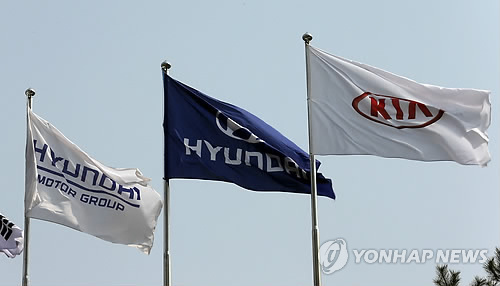The sales of South Korea’s two largest automakers, Hyundai Motor and Kia Motors, continued to plunge in China last month amid growing competition in the local market, as well as the prolonged political tension between China and South Korea over the deployment of a US missile defense system.
Hyundai Motor and its sister company Kia Motors last month sold a total 76,010 vehicles in China, compared to 124,116 units in August last year, according to the companies’ data.
Hyundai Motor’s sales in August this year declined by 35.4 percent to reach 53,800 units, and Kia Motors’ sales dropped by 45.5 percent to mark sales of 23,200 units.
During the January-August period, combined sales of the two companies fell 44.7 percent on-year to 576,974 vehicles from 1,043,496 units during the same period last year.

While Korean carmakers suffered from the sales slump, Chinese automakers boosted their sales. As of July 2017, Chinese carmakers’ overall sales increased by 4.1 percent on-year to reach 15.3 million units, according to data compiled by the China Association of Automobile Manufacturers.
Chinese carmakers are quickly expanding based on technological knowhow that they have absorbed from foreign carmakers, while Korean carmakers are losing its market identity to cheaper local brands, industry sources have noted.
Amid the sales decline, the two Korean automakers have also suffered glitches in operations with their local partner company BAIC Motor, which has a 50 percent stake in the joint venture Beijing Hyundai Motor.
BAIC Motor had reportedly demanded Hyundai Motor shift to cheaper Chinese auto parts suppliers to reduce costs, but Hyundai Motor has maintained its position of maintaining the existing suppliers.
There are currently 145 Korean parts companies that operate 289 factories in China, according to the Korea Auto Industries Coop Association. Of the 145 companies, 120 entered the Chinese auto market alongside Hyundai Motor and Kia Motors, meaning they depend on the automakers’ success.
Consequently, the combined operation rate of the 145 parts suppliers has remained under 50 percent on the back of poor sales by the Korean carmakers.
Hyundai Motor and Kia Motors are trying to come up with measures to tackle their sales drop.
Hyundai Motor has newly appointed Tao Hung Tan for its Chinese operation early this month, hoping that his Chinese background would help recover the business there.
The supplier issue is forecast to be eased as BAIC has resumed making payments to parts suppliers after a series of discussions, the company said.
Hyundai Motor also decided to provide 250 billion won ($220 million) of financial support to its parts producers during this year to help them to secure better liquidity.
With recently launched car models such as Kona, Stonic and Genesis G70, Hyundai Motor and Kia Motors aims to recover sales in the overseas market, the companies have explained.
By Shim Woo-hyun (ws@heraldcorp.com)
-
Articles by Shim Woo-hyun



![[Exclusive] Korean military set to ban iPhones over 'security' concerns](http://res.heraldm.com/phpwas/restmb_idxmake.php?idx=644&simg=/content/image/2024/04/23/20240423050599_0.jpg&u=20240423183955)



![[Herald Interview] 'Amid aging population, Korea to invite more young professionals from overseas'](http://res.heraldm.com/phpwas/restmb_idxmake.php?idx=644&simg=/content/image/2024/04/24/20240424050844_0.jpg&u=20240424200058)


![[Pressure points] Leggings in public: Fashion statement or social faux pas?](http://res.heraldm.com/phpwas/restmb_idxmake.php?idx=644&simg=/content/image/2024/04/23/20240423050669_0.jpg&u=)









